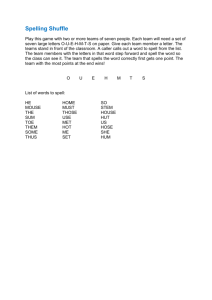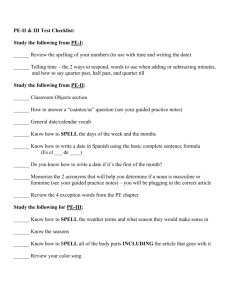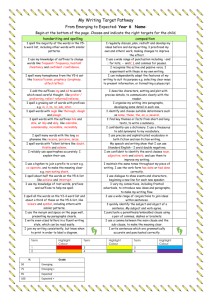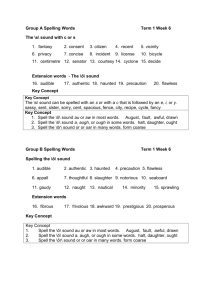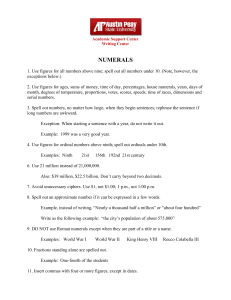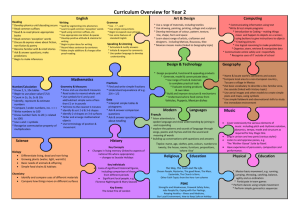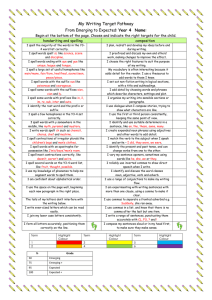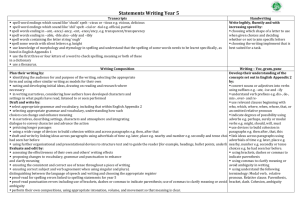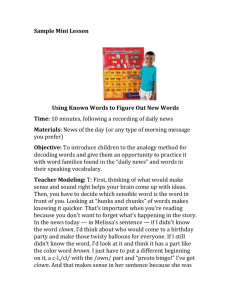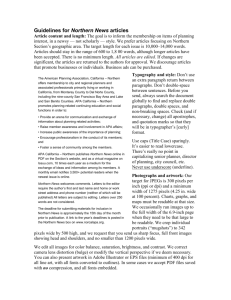Ashville College Junior School Curriculum Overview * Year 4
advertisement
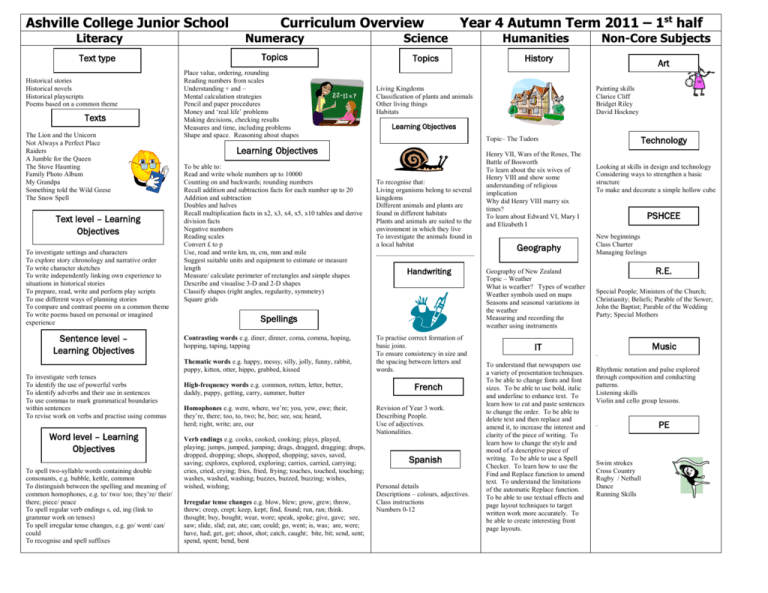
Ashville College Junior School Curriculum Overview Literacy Numeracy Science Text type Topics Topics Historical stories Historical novels Historical playscripts Poems based on a common theme Texts The Lion and the Unicorn Not Always a Perfect Place Raiders A Jumble for the Queen The Stove Haunting Family Photo Album My Grandpa Something told the Wild Geese The Snow Spell Text level – Learning Objectives To investigate settings and characters To explore story chronology and narrative order To write character sketches To write independently linking own experience to situations in historical stories To prepare, read, write and perform play scripts To use different ways of planning stories To compare and contrast poems on a common theme To write poems based on personal or imagined experience Sentence level – Learning Objectives Place value, ordering, rounding Reading numbers from scales Understanding + and – Mental calculation strategies Pencil and paper procedures Money and ‘real life’ problems Making decisions, checking results Measures and time, including problems Shape and space. Reasoning about shapes To be able to: Read and write whole numbers up to 10000 Counting on and backwards; rounding numbers Recall addition and subtraction facts for each number up to 20 Addition and subtraction Doubles and halves Recall multiplication facts in x2, x3, x4, x5, x10 tables and derive division facts Negative numbers Reading scales Convert £ to p Use, read and write km, m, cm, mm and mile Suggest suitable units and equipment to estimate or measure length Measure/ calculate perimeter of rectangles and simple shapes Describe and visualise 3-D and 2-D shapes Classify shapes (right angles, regularity, symmetry) Square grids Word level – Learning Objectives To spell two-syllable words containing double consonants, e.g. bubble, kettle, common To distinguish between the spelling and meaning of common homophones, e.g. to/ two/ too; they’re/ their/ there; piece/ peace To spell regular verb endings s, ed, ing (link to grammar work on tenses) To spell irregular tense changes, e.g. go/ went/ can/ could To recognise and spell suffixes High-frequency words e.g. common, rotten, letter, better, daddy, puppy, getting, carry, summer, butter Homophones e.g. were, where, we’re; you, yew, ewe; their, they’re, there; too, to, two; be, bee; see, sea; heard, herd; right, write; are, our Verb endings e.g. cooks, cooked, cooking; plays, played, playing; jumps, jumped, jumping; drags, dragged, dragging; drops, dropped, dropping; shops, shopped, shopping; saves, saved, saving; explores, explored, exploring; carries, carried, carrying; cries, cried, crying; fries, fried, frying; touches, touched, touching; washes, washed, washing; buzzes, buzzed, buzzing; wishes, wished, wishing; Irregular tense changes e.g. blow, blew; grow, grew; throw, threw; creep, crept; keep, kept; find, found; run, ran; think. thought; buy, bought; wear, wore; speak, spoke; give, gave; see, saw; slide, slid; eat, ate; can; could; go, went; is, was; are, were; have, had; get, got; shoot, shot; catch, caught; bite, bit; send, sent; spend, spent; bend, bent Non-Core Subjects History Art Painting skills Clarice Cliff Bridget Riley David Hockney Learning Objectives Technology Topic– The Tudors To recognise that: Living organisms belong to several kingdoms Different animals and plants are found in different habitats Plants and animals are suited to the environment in which they live To investigate the animals found in a local habitat _____________________________ Handwriting Spellings Contrasting words e.g. diner, dinner, coma, comma, hoping, hopping, taping, tapping Humanities Living Kingdoms Classification of plants and animals Other living things Habitats Learning Objectives Thematic words e.g. happy, messy, silly, jolly, funny, rabbit, puppy, kitten, otter, hippo, grabbed, kissed To investigate verb tenses To identify the use of powerful verbs To identify adverbs and their use in sentences To use commas to mark grammatical boundaries within sentences To revise work on verbs and practise using commas Year 4 Autumn Term 2011 – 1st half To practise correct formation of basic joins. To ensure consistency in size and the spacing between letters and words. French Revision of Year 3 work. Describing People. Use of adjectives. Nationalities. Spanish Personal details Descriptions – colours, adjectives. Class instructions Numbers 0-12 Henry VII, Wars of the Roses, The Battle of Bosworth To learn about the six wives of Henry VIII and show some understanding of religious implication Why did Henry VIII marry six times? To learn about Edward VI, Mary I and Elizabeth I Geography Geography of New Zealand Topic – Weather What is weather? Types of weather Weather symbols used on maps Seasons and seasonal variations in the weather Measuring and recording the weather using instruments IT To understand that newspapers use a variety of presentation techniques. To be able to change fonts and font sizes. To be able to use bold, italic and underline to enhance text. To learn how to cut and paste sentences to change the order. To be able to delete text and then replace and amend it, to increase the interest and clarity of the piece of writing. To learn how to change the style and mood of a descriptive piece of writing. To be able to use a Spell Checker. To learn how to use the Find and Replace function to amend text. To understand the limitations of the automatic Replace function. To be able to use textual effects and page layout techniques to target written work more accurately. To be able to create interesting front page layouts. Looking at skills in design and technology Considering ways to strengthen a basic structure To make and decorate a simple hollow cube PSHCEE New beginnings Class Charter Managing feelings R.E. Special People; Ministers of the Church; Christianity; Beliefs; Parable of the Sower; John the Baptist; Parable of the Wedding Party; Special Mothers Music . Rhythmic notation and pulse explored through composition and conducting patterns. Listening skills Violin and cello group lessons. . Swim strokes Cross Country Rugby / Netball Dance Running Skills PE
